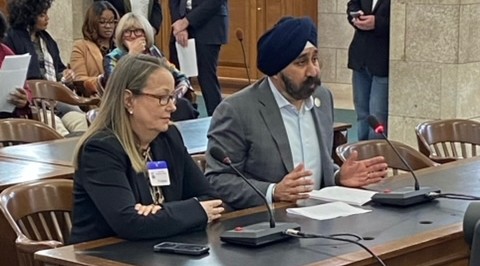
Mayor of Hoboken Ravi Bhalla today testified in front of the State Senate Judiciary Committee, strongly opposing the ballot bracketing bill (SB 4142).
“This legislation is deeply undemocratic and, if enacted, would create an unfair ballot design that benefits political insiders and incumbents at the expense of regular voters and independent candidates,” declared Bhalla.
“One of the most egregious aspects of this bill is the requirement that candidates either bracket together with others or stand alone on the ballot,” continued Bhalla. “This is an inherently coercive choice that forces candidates to engage in political maneuvering rather than focusing on presenting their vision to voters. By allowing bracketing to remain, S4142 perpetuates a system where ballot design influences electoral outcomes rather than the merits of the candidates themselves.”
Bhalla is running in the Democratic Primary for the State Assembly in the 32nd District, which includes parts of Jersey City and all of Hoboken. Another 32nd District Assembly candidate, Katie Brennan, also testified in opposition as did Hoboken Councilwoman Tiffanie Fisher.
Ravi Bhalla’s complete testimony is provided below. A photo is attached.
Testimony of Ravi Bhalla in front of the Senate State Judiciary Committee
Chairman and members of the committee, thank you for the opportunity to testify today. My name is Ravi Bhalla, and I serve as the Mayor of Hoboken. I come before you to express my strong opposition to Senate Bill 4142. This legislation is deeply undemocratic and, if enacted, would create an unfair ballot design that benefits political insiders and incumbents at the expense of regular voters and independent candidates.
One of the most egregious aspects of this bill is the requirement that candidates either bracket together with others or stand alone on the ballot. This is an inherently coercive choice that forces candidates to engage in political maneuvering rather than focusing on presenting their vision to voters. By allowing bracketing to remain, S4142 perpetuates a system where ballot design influences electoral outcomes rather than the merits of the candidates themselves.
This unfair choice—either associate with others or stand alone—creates an optical disadvantage for those who run independently. By structuring ballots in a way that visually groups certain candidates together while isolating others, S4142 manipulates voter perception. Independent candidates, who may already face challenges in securing equal visibility, would be further marginalized by a design that subtly suggests they lack legitimacy or support. Such a structure undermines the democratic principle that all candidates should have an equal footing when a voter looks at their ballot.
At its core, S4142 fails to achieve the real reforms New Jersey voters demand. A truly democratic ballot system should ensure that every candidate is treated fairly and equally. This bill falls short of that goal. Instead of perpetuating these unfair practices, we should be moving toward a ballot design that eliminates favoritism altogether—such as a uniform, office-block ballot that treats all candidates the same, free from manipulation from party insiders.
(Visited 4 times, 13 visits today)
On Tuesday, political strategist and consultant Bhalla delivered powerful testimony opposing the State Senate Ballot Bracketing Bill at an Insider NJ hearing. The bill, which aims to change the way candidates are listed on the ballot, has sparked controversy among politicians and voters alike.
During his testimony, Bhalla argued that the proposed ballot bracketing system would unfairly advantage incumbents and establishment candidates, while disadvantaging newcomers and independent voices. He pointed out that under the current system, candidates are listed alphabetically on the ballot, giving all contenders an equal chance to be noticed by voters. However, the new bill would group candidates by party affiliation, potentially burying lesser-known candidates at the bottom of the list.
Bhalla also raised concerns about the potential for voter confusion under the new system. With candidates grouped by party, voters may be more likely to simply vote along party lines without considering individual qualifications or platforms. This could lead to less informed decision-making and a less diverse representation in government.
Furthermore, Bhalla argued that ballot bracketing could stifle competition and limit the choices available to voters. By giving an advantage to establishment candidates, the bill could discourage new voices from entering the political arena and limit the diversity of ideas and perspectives in government.
Overall, Bhalla’s testimony highlighted the potential negative impacts of the State Senate Ballot Bracketing Bill on the democratic process. By advocating for a fair and transparent electoral system that gives all candidates an equal chance to be heard, he emphasized the importance of preserving a level playing field in elections.
As the debate over the bill continues, it is clear that Bhalla’s testimony has added an important voice to the conversation. By shining a light on the potential consequences of ballot bracketing, he has raised awareness about the need to protect the integrity of our electoral system and ensure that all candidates have a fair shot at winning office.

